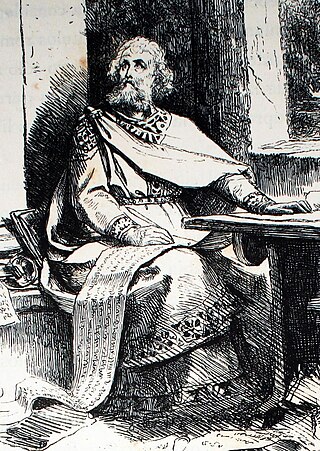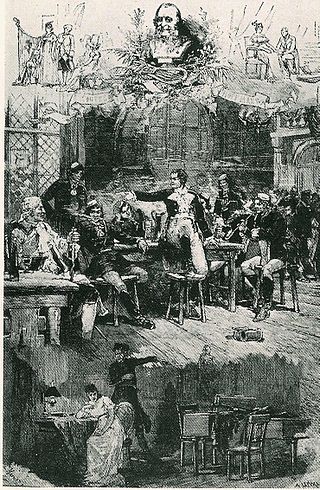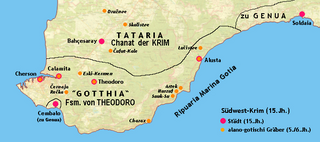Related Research Articles
The Goths were a Germanic people who played a major role in the fall of the Western Roman Empire and the emergence of medieval Europe. They were first reported by Graeco-Roman authors in the 3rd century AD, living north of the Danube in what is now Ukraine, Moldova, and Romania. From here they conducted raids into Roman territory, and large numbers of them joined the Roman military. These early Goths lived in the regions where archaeologists find the Chernyakhov culture, which flourished throughout this region during the 3rd and 4th centuries.

Ulfilas (Greek: Οὐλφίλας; c. 311 – 383), known also as Wulfila(s) or Urphilas, was a 4th-century Gothic preacher of Cappadocian Greek descent. He was the apostle to the Gothic people.

Stephen Wolfram is a British-American computer scientist, physicist, and businessman. He is known for his work in computer algebra and theoretical physics. In 2012, he was named a fellow of the American Mathematical Society.

Wolfram von Eschenbach was a German knight, poet and composer, regarded as one of the greatest epic poets of medieval German literature. As a Minnesinger, he also wrote lyric poetry.

Wolframite is an iron, manganese, and tungstate mineral with a chemical formula of (Fe,Mn)WO4 that is the intermediate mineral between ferberite (Fe2+ rich) and hübnerite (Mn2+ rich). Along with scheelite, the wolframite series are the most important tungsten ore minerals. Wolframite is found in quartz veins and pegmatites associated with granitic intrusives. Associated minerals include cassiterite, scheelite, bismuth, quartz, pyrite, galena, sphalerite, and arsenopyrite.

The Tales of Hoffmann is an opéra fantastique by Jacques Offenbach. The French libretto was written by Jules Barbier, based on three short stories by E. T. A. Hoffmann, who is the protagonist of the story. It was Offenbach's final work; he died in October 1880, four months before the premiere.

Parzival is a medieval chivalric romance by the poet and knight Wolfram von Eschenbach in Middle High German. The poem, commonly dated to the first quarter of the 13th century, centers on the Arthurian hero Parzival and his long quest for the Holy Grail following his initial failure to achieve it.

The Crimean Goths were either a Greuthungi-Gothic tribe or a Western Germanic tribe that bore the name Gothi, a title applied to various Germanic tribes that remained in the lands around the Black Sea, especially in Crimea. They were the longest-lasting of the Gothic communities. Their existence is well attested through the ages, though the exact period when they ceased to exist as a distinct culture is unknown; as with the Goths in general, they may have become diffused among the surrounding peoples. In his Fourth Turkish letter, Ogier Ghiselin de Busbecq (1522–1592) describes them as "a warlike people, who to this day inhabit many villages".

Christine Errath is a German former figure skater who represented East Germany in competition. She is the 1976 Olympic bronze medalist, the 1974 World champion, and a three-time European champion.

Wolfram Löwe is a former German footballer.
Wolfram Wuttke was a German professional footballer who played as a midfielder.

Herwig Wolfram is an Austrian historian who is Professor Emeritus of Medieval History and Auxiliary Sciences of History at the University of Vienna and the former Director of the Institute of Austrian Historical Research. He is a leading member of the Vienna School of History, and internationally known for his authoritative works on the history of Austria, the Goths, and relationships between the Germanic peoples and the Roman Empire.

Heinrich von Veldeke is the first writer in the Low Countries known by name who wrote in a European language other than Latin. He was born in Veldeke, which was a hamlet of Spalbeek, part of the municipality of Hasselt, Limburg, Belgium, since 1977. The "Vel(de)kermolen", a water mill on the Demer River, is the only remainder of the hamlet. In Limburg, he is celebrated as a writer of Old Limburgish.
Middle High German literature refers to literature written in German between the middle of the 11th century and the middle of the 14th. In the second half of the 12th century, there was a sudden intensification of activity, leading to a 60-year "golden age" of medieval German literature referred to as the mittelhochdeutsche Blütezeit. This was the period of the blossoming of Minnesang, MHG lyric poetry, initially influenced by the French and Provençal tradition of courtly love song. The same sixty years saw the composition of the most important courtly romances. again drawing on French models such as Chrétien de Troyes, many of them relating Arthurian material. The third literary movement of these years was a new revamping of the heroic tradition, in which the ancient Germanic oral tradition can still be discerned, but tamed and Christianized and adapted for the court.

A Strange Guest is a 1936 German drama film directed by Gerhard Lamprecht and starring Alfred Abel, Ilse Petri and Kurt Fischer-Fehling.

Volkmar Klein is a German politician of the Christian Democratic Union (CDU). He has been a member of the German Bundestag since 2009 and was a member of the Landtag of North Rhine-Westphalia from 1995 until 2009.

Karsten Klein is a German politician of the Free Democratic Party (FDP) who has been serving as a member of the Bundestag from the state of Bavaria since 2017.

Maria Anna Klein-Schmeink is a German politician of Alliance 90/The Greens who has been serving as a member of the Bundestag from the state of North Rhine-Westphalia since 2009.
Wolfram Bergerowski was a German politician of the Free Democratic Party (FDP) and former member of the German Bundestag.
References
- 1 2 "Klein, Wolfram". kicker.de (in German). Archived from the original on 4 March 2016. Retrieved 23 March 2012.